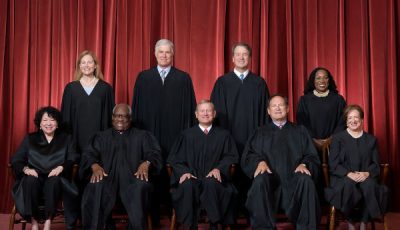Not Sure What “Prurient” Means? That’s OK; The SBA Doesn’t Know, Either
 EASTON, Pa. – The headline news out of Judge Edward G. Smith’s chambers at the U.S. District Court for the Eastern District of Pennsylvania is that there’s a settlement afoot between the plaintiffs and the U.S. Small Business Administration (“SBA”) in MAG Enterprises v. United States Small Business Administration, one of several lawsuits challenging’s the SBA’s ban on issuing COVID disaster-related loans to various types of adult businesses.
EASTON, Pa. – The headline news out of Judge Edward G. Smith’s chambers at the U.S. District Court for the Eastern District of Pennsylvania is that there’s a settlement afoot between the plaintiffs and the U.S. Small Business Administration (“SBA”) in MAG Enterprises v. United States Small Business Administration, one of several lawsuits challenging’s the SBA’s ban on issuing COVID disaster-related loans to various types of adult businesses.
In a stipulated order that stayed the case pending a settlement between the parties, Judge Smith gave the parties until the end of this month to either hammer out the details of the settlement or provide the court with a joint status report.
That’s the headline news from the case, but to me the more interesting story is one found deep within the plaintiffs’ second amended complaint, which was filed in the case back in September of last year. That story involves the government’s attorneys appearing to have a hard time deciding just what the words “prurient” and “obscene” mean in the context of the rules governing how the SBA goes about deciding who is and isn’t eligible for the loans it issues.
In a sense, this all goes back to 1953, when Congress created the SBA. In the same year the office was created, the SBA published a rule called the “Opinion Molder Rule”, which established that, with some exceptions, the SBA could not issue loans to any applicant engaged in the “creation, origination, expression, dissemination, propagation or distribution of ideas, values, thoughts, opinions or similar intellectual property regardless of medium, form or content.”
The government’s reasoning, according to what was published in the Federal Register at the time, was that this prohibition on loaning money to “opinion molders” would “avoid any possible accusation that the Government is attempting to control editorial freedom by subsidizing media or communication for political or propaganda purposes,” while allowing the agency to “avoid Government identification through its business assistance programs with concerns which might publish or produce matters of a religious or controversial nature.” The SBA also said it recognized “that the constitutionally protected rights of freedom of speech and press ought not to be compromised either by the fear of Government reprisal or by the expectation of Government financial assistance.”
The Opinion Molder Rule sat unchanged for about 41 years, until 1994, when the SBA repealed the rule “primarily in order to make assistance available to a larger universe of small businesses.” After the SBA issued its new “Media Policy Rule” that replaced the Opinion Molder Rule, Congress got involved and decided the new rule needed an exception – one that would prevent the SBA from funding anything “obscene.”
What Congress did was add subsection (e) to Section 633 of Title 15 of the United States Code. That section reads as follows: “(e) Prohibition on provision of assistance: Notwithstanding any other provision of law, the Administration is prohibited from providing any financial or other assistance to any business concern or other person engaged in the production or distribution of any product or service that has been determined to be obscene by a court of competent jurisdiction.”
Note that it specifies “…the production or distribution of any product or service that has been determined to be obscene by a court of competent jurisdiction.” What the portion I’ve emphasized in bold text meant was that the SBA was prohibited from loaning money to entities that had been convicted of obscenity crimes – which is a far cry from a ban on loaning money to any adult business.
The current version of the SBA rule states that the following types of businesses are ineligible for the agency’s loans: “Businesses which: (1) Present live performances of a prurient sexual nature; or (2) Derive directly or indirectly more than de minimis gross revenue through the sale of products or services, or the presentation of any depictions or displays, of a prurient sexual nature.”
This brings us (finally) back to the MAG Enterprises case and a salient point made by the plaintiffs: none of them has ever been charged with an obscenity crime, let alone convicted of one.
“Similarly, none of the entertainers who have performed on MAG Enterprises premises have ever been charged with, let alone convicted of, any crimes of obscenity related to their performances at MAG Enterprises,” the plaintiffs noted in their complaint.
This would seem to be open and shut – except the SBA’s position is that it can deny loans to these businesses under its rules, regardless of whether the business in question has been convicted of an obscenity crime. The SBA says those businesses can still be deemed to provide entertainment of a “prurient sexual nature”, even absent any charge or conviction.
The problem for the SBA is that in taking this position in court, not just in the MAG case but others challenging the relevant rule, the agency seems to be using a meandering, malleable definition of terms like “prurient” and “obscene.”
As the MAG plaintiffs noted in their complaint, in another case, DV Diamond, at a hearing on April 30, 2020, the SBA took the position that “prurient” meant “tending to arouse a ‘lustful’ or, you know ‘lascivious’ interest in sex.”
“The SBA’s interpretation of ‘prurient,’ simply refers to, you know, invoking an avert [sic] strong sexual interest,” an attorney for the agency added at the time.
In a hearing in the same case less than a week later, the court observed that the SBA had changed its position, as it had previously argued that the term “prurient” meant “erotic.”
“In response to the court pointing out this inconsistency and also noting that such operationalization would render the Regulation unconstitutionally overbroad, the SBA retreated to its previous position that ‘prurient’ means ‘lascivious or lustful,’” MAG noted in its complaint.
In Camelot Banquet, another case referenced by the MAG plaintiffs, the SBA took the position that businesses featuring live dancing explicitly intended to be “erotic” undoubtedly fall within the plain language of the regulation and noted that the agency “has restricted government-backed small-business loans to businesses engaged in live erotic performances for nearly twenty-five years.”
In a reply brief filed in the Seventh Circuit, the SBA took the position that as the SBA rule used the word “prurient” that the plaintiffs’ businesses “which present live nude and semi-nude dance performances that are explicitly intended to be erotic — thus fall within the heart of the regulation’s scope.”
My favorite exchange in all this discussion of the proper definitions of “prurient” and “obscene”, as related in the MAG plaintiffs’ complaint, comes from a Texas case, D. Houston Inc. v. United States Small Bus. Admin. In that case, the court raised the key question that appears to be dogging the SBA as it defends its rule against all these adult business plaintiffs:
“The Court: Who’s to determine what’s a prurient interest? You know, there’s the famous, what is it, Potter Stewart opinion, you know, the pornography opinion that came out, what, in the ’50s? I think Stewart was on the Court at that time. He said he can’t define it but he knows it when he sees it? Are we in an area like that?
Attorney for the SBA: It’s vague, your Honor.”
While I doubt this was the spirit in which the SBA’s response to the court was offered, I must say it’s refreshing to see the government agree with those of us in the adult industry on this point, for a change.













